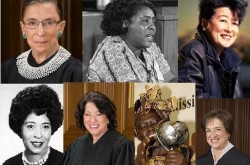A part of Women’s History Month, March 8th is International Women’s Day. Marking the contributions women have made to society throughout history, the day also serves as an opportunity to reflect on the women who have inspired all of us.
Over half of Mayor Kenney’s appointees are women, so we asked them which women inspired them early in their own careers — and which continue to serve as inspirations to them today.
Here are a few of their answers.

Nina Ahmad, Deputy Mayor for Public Engagement, says activist and writer Helen Zia inspires her.
“Always stay true to your passion, never fear standing up and raising your voice for what is right, and get organized because together we can change the world.” – Helen Zia
“As a member of its first graduating class of women from Princeton University, Helen Zia, the daughter of immigrants from Shanghai, has been blazing the way for justice and equity in our society,” Nina says. Pointing to Zia’s diverse career from construction laborer to autoworker to activist and writer, Nina adds that Zia “has been an outspoken advocate for women’s rights and countering violence and homophobia. And, she was instrumental in galvanizing the Asian American community to demand justice in the aftermath of the murder of Vincent Chin in 1982, playing a critical role in bringing federal civil rights charges against the perpetrators.”
Christine Knapp, Director of the Office of Sustainability, highlighted Kenyan environmental and political activist Wangari Maathai.
“She founded the Green Belt Movement in Kenya in the 1970s,” Christine explains, “which focused on planting trees to counter decades of environmental degradation and employed women by planting trees to help improve their quality of life. The Green Belt Movement expanded beyond Kenya to dozens of other countries, leading to the Pan-African Green Belt Network.” Christine says that Maathai “faced hostility and threats from her husband, her opponents, and her own government, but she never stopped fighting for her values.” In 2002, Maathai was elected to parliament, and in 2004, she received the Nobel Peace Prize. Maathai succumbed to ovarian cancer in 2011.

Anne Gemmell, Director of Pre-K, says voting and civil rights activist Fannie Lou Hamer, is a steadfast inspiration.
“I am sick and tired of being sick and tired!” – Fannie Lou Hamer
“She was a tough, in-your-face, tell-it-like-it-is presence who spoke truth to power and stood up to the white power structure that ruled the state of Mississippi last century,” Anne says. “Hamer’s big spirit was only matched by her passion for civil and human rights.” Anne goes on to say that Hamer once courageously, and publicly, chronicled to political leaders “in graphic detail the vicious 1963 beating she received in a Mississippi jailhouse that left her with severe kidney damage, a blood clot behind one eye, and a permanent limp. Hamer courageously declared in her plaintive, outspoken way, ‘I am sick and tired of being sick and tired!'”
Susan Gobreski, Director of Community Schools, is inspired by Daisy Bates.
“Ms. Bates was involved with the NAACP and with plans to challenge school segregation in Little Rock, Arkansas,” Susan explains. “She helped organize and support the Little Rock Nine, an extraordinary effort. She and her husband started a newspaper that focused on covering what was happening in the South. Then, Bates went to work in the Johnson Administration fighting poverty.” Susan says she admires Bates “because she devoted herself to justice and understood the role that both leaders and ordinary citizens play in the quest for a better society. She used her position to fight for the education of all children.”

Nellie Fitzpatrick, Director of LGBT Affairs, cites not just one but three women as an inspirational triumvirate: Supreme Court Justices Ruth Bader Ginsburg, Sonia Sotomayor, and Elena Kagan.
“People ask me sometimes, when — when do you think it will be enough? When will there be enough women on the court. And, my answer is, ‘When there are nine.'” – Ruth Bader Ginsburg
“It’s remarkable that three of the four women ever to serve on the Supreme Court are currently on the bench,” Nellie says. “All three are strong voices and champions of women’s rights. I was especially grateful for their voices last week after reading about the oral arguments in Whole Woman’s Health v. Hellerstedt, the most important abortion rights case since Casey,” Nellie adds. “The three female justices’ questions, especially Justice Ginsburg’s, filled me with hope and optimism about the future of the Court and our country. Last year, when asked about when there will be ‘enough’ women on the high court, her answer was, ‘When there are nine.’ I couldn’t agree more!”

